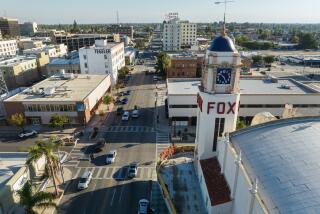Prodded by Rival, Rep. Cox Asks Security Review of UCI Reactor
Responding to his opponent in this year’s election campaign, Rep. Christopher Cox has ordered the Homeland Security Committee he heads to examine concerns that a small nuclear reactor at UC Irvine is vulnerable to terrorist attack.
Cox, a Republican from Newport, said the security review was prompted by John Graham, a UCI business professor and Democratic candidate who charged this week that terrorists could easily blow up the research reactor and spread harmful radiation through the campus.
The 35-year-old reactor, which generates a fraction of the power of a commercial nuclear plant and operates only a few hours a week, is in a concrete-lined pool beneath the university’s complex of science buildings, where thousands of students attend classes.
Though there are alarms, sensors and television monitors, the reactor is easily reached in the basement of Rowland Hall. The only thing separating it from the public is a wall and windows of safety plate glass. There are no guards, security barriers or security perimeters.
“While UCI disputes your concerns, I fully share your desire to make certain that UCI’s reactor does not pose a threat to the campus or the larger community,” Cox stated in a letter sent to Graham on Wednesday.
The UCI professor is running against Cox in the 47th Congressional District, which includes Newport Beach, Costa Mesa and Irvine. At a news conference Monday, Graham demanded the closure of the reactor and accused the incumbent of not informing his district or protecting it from what he considers a potentially serious security breach at the campus.
Cox said he is willing to work with Graham because he works at UCI and has raised serious concerns about the university reactor. He added that committee staff members have already contacted UCI officials.
“We are making a further inquiry to ensure that the university’s representations are accurate,” Cox said.
Graham, who said he worked with high explosives when he served in the Navy, praised his opponent for taking an interest in the reactor and he said he looked forward to meeting with committee members.
There are 35 research and test reactors in 23 states -- 26 of them at university campuses, according to the federal Nuclear Regulatory Commission. Ten more are being decommissioned.
In addition to universities, research reactors are operating at companies as well as government and military research facilities. They are inspected and licensed by the NRC.
Scott Burnell, a commission spokesman, said all research and test reactors were included in security enhancements issued by the commission since the Sept. 11 attacks. In 1993, however, the NRC dropped its requirement that research reactors have physical barriers.
At UCI, which is on the state attorney general’s list of potential terrorist targets, officials say they have taken steps to make the reactor more secure.
They include surveillance cameras, stepped-up police patrols, alarms and motion detectors. Users must undergo background checks, and visitors must provide their Social Security numbers before entering the reactor room.
“We feel relatively at ease about it,” said UCI Police Chief Al Brown. “The NRC monitors the reactor. It is deep in the basement, surrounded by concrete. The risk of anything happening is very low.”
The UCI reactor is a low-power type that cannot melt down even if its cooling water drains. The reactor core is submerged under almost 25 feet of water and contained in a pool with concrete walls 2 to 5 feet thick. Under the pool is an impermeable layer of clay and rock.
UCI chemistry professor George Miller, who supervises the reactor, said the site is an unlikely terrorist target because the fuel is not weapons-grade and radioactive materials that could be used to make a so-called dirty bomb are stored in vaults that are difficult to open.
More to Read
Start your day right
Sign up for Essential California for news, features and recommendations from the L.A. Times and beyond in your inbox six days a week.
You may occasionally receive promotional content from the Los Angeles Times.







